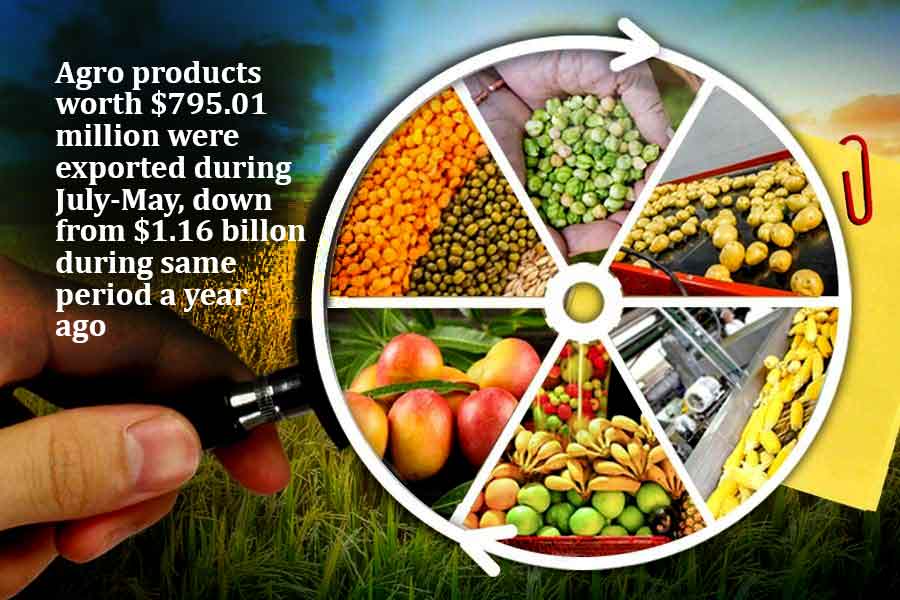
Published :
Updated :

Bangladesh's impressive agro products export has made a significant fall in the outgoing fiscal from its billion-dollar-export-earning club due to the government's policy intervention and the decline in global demand.
Business insiders and regulators said the global economic turmoil and the government's strict measures in checking malpractices on receiving export incentives has dampened the growth of the country's promising agricultural products export in the outgoing fiscal year of 2022-23 (FY2023).
As per the Export Promotion Bureau (EPB) data, the shipment of agricultural products, including vegetables, dry food, processed food, fruits and tobacco, has fallen by 27.78 per cent till May of FY2023 compared to the corresponding period of the immediate last fiscal.
The agro-process industry had exported goods worth US$795.01 million during the July-May period of the current FY2023. In the same period last fiscal year, the earnings were $1.16 billion.
Agricultural-product exports shined bright in Bangladesh's export basket with its proceeds crossing the billion-dollar mark in FY2021 and continued the growth in the last FY2022, raising hopes for the country's overall external trade to see a boost.
In FY2021, the agricultural goods and relevant processed foods fetched $1.03 billion. In the last FY2022, the sector earned $1.16 billion worth of foreign exchange, 13.04-percent higher year-on-year, EPB data show.
However, analysts say the fall from the billion-dollar-earner club has made the country's business and policy-makers worry as it has affected the country's much-needed export-basket diversification move, away from overdependence on readymade garments.
The apparel sector has been the single-largest export earner for Bangladesh for more than three decades, contributing around 80 per cent to the total export earnings.
The FE analysis has found that the export of vegetables, dry food, fruits and tea has dropped significantly during the first 11 months (Jul-May) of the current FY2023, prompting a negative growth of the overall agro export earnings of the country.
Although the spices and tobacco export has increased, the vegetable export has fallen by 39.39 per cent to $58.03 million in July-May period of the current fiscal from $95.75 million in the corresponding period of last FY2022.
The shipment of dry foods has declined by 18.31 per cent to $188.75 million in 11 months this fiscal from $231.09 million in the corresponding period last fiscal.
The export of fruits during the July-May period plunged to $0.98 million from $5.25 million in the same period of FY2022, the FE analysis has found.
A Bangladesh Bank (BB) official said they have controlled the misuse of the government-offered incentive benefit for the agro-export, resulting in an immediate effect on the foreign exchange earnings.
"The malpractice dealt a heavy blow to the real exporters. Although it [BB action] has a negative impact on the export earnings in the short term, the export will bounce back within a couple of years," he told the FE, requesting anonymity.
The National Board of Revenue (NBR) and the office of the Comptroller Auditor General (CAG) are working strictly on the misuse of export incentives by some local companies.
"Some exporters used to submit fake export documents with higher volume of shipment and claim incentives from the government. So, the export earnings were shown high."
"But it has decreased due to strict monitoring. Actually it is the real picture of the agro-product exports," an official at the CAG office told the FE.
Khurshid Ahmad Farhad, general manager of Bombay Sweets & Company Ltd, said agro-product exports have fallen as the global demand has dropped a bit.
Besides, some reforms in the agro-export sector by the government might have some impacts on the export earnings for the short-term period - things will get back on track within a couple of years, he said.
"The export will be growing in the future as many companies of Bangladesh are now trying to expand their market overseas, with agro-processing industries flourishing and holding high prospects," Mr Khurshid observed.
"Our company is also expanding its capacity and diversifying the products, focusing both foreign and local markets. We are hopeful of getting a big boost in the export volume within the next couple of years," he added.
The local companies export to the United Kingdom, UAE, Malaysia, Singapore, Saudi Arabia, and different middle-eastern markets alongside some Asian, African and South-Asian countries.
kabirhumayan10@gmail.com


 For all latest news, follow The Financial Express Google News channel.
For all latest news, follow The Financial Express Google News channel.